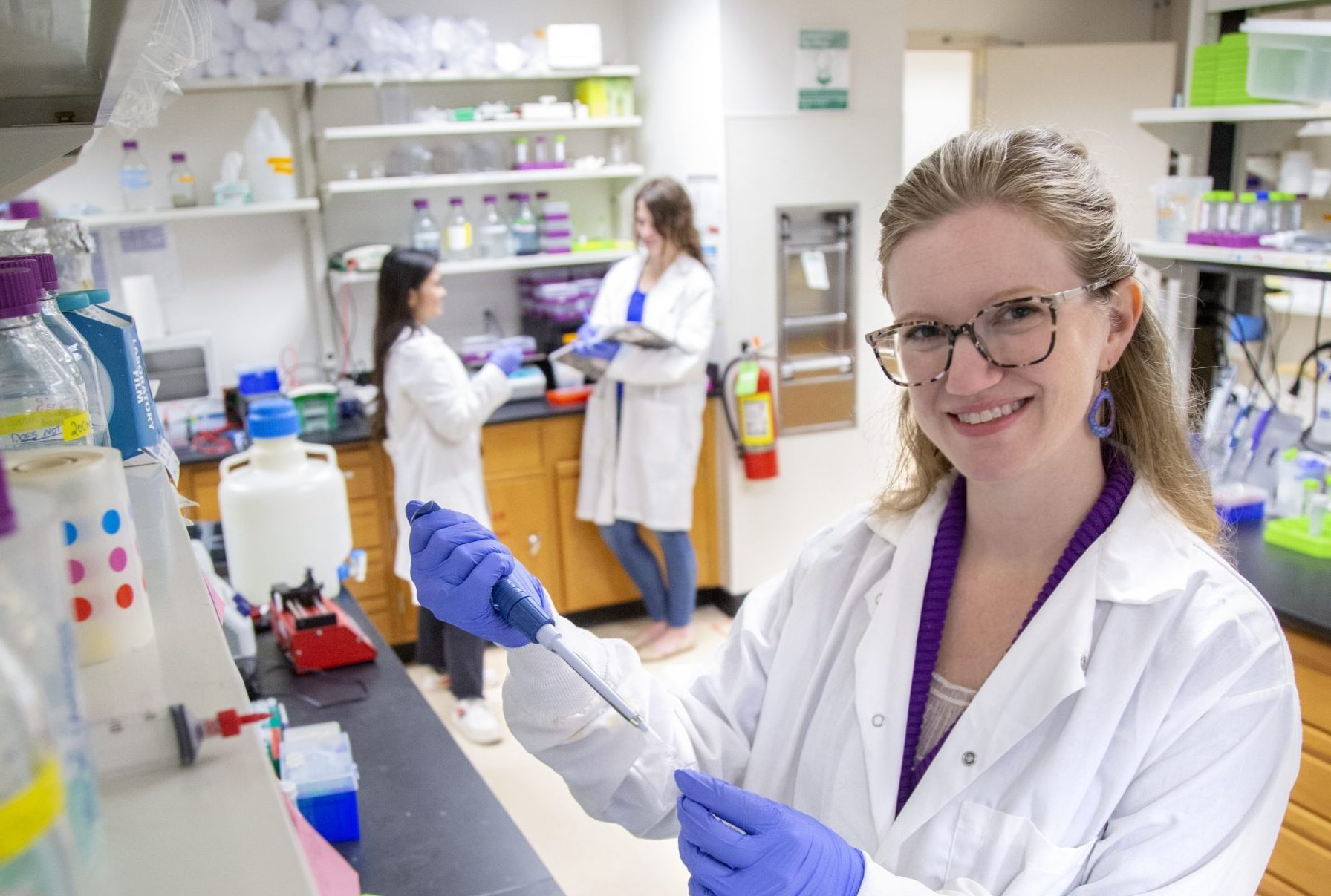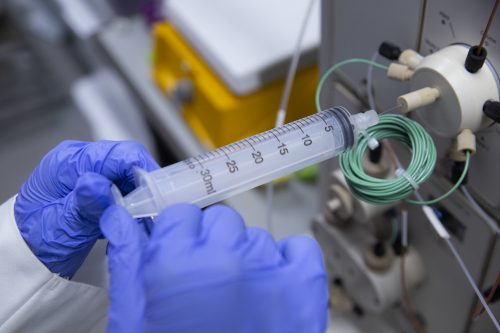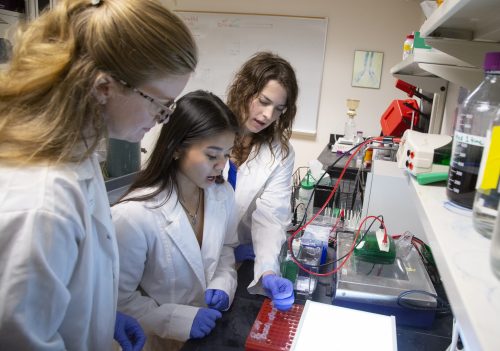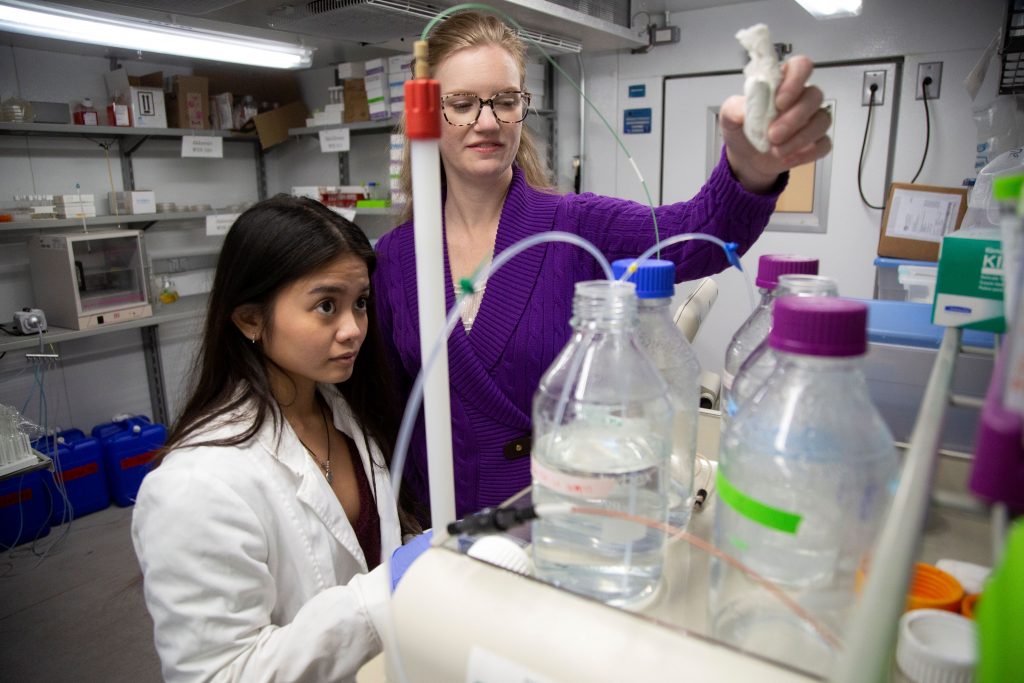Unwanted Inheritance
Mikaela Stewart’s research is geared toward disarming a deadly breast cancer gene.

Mikaela Stewart is studying Breast Cancer gene 1 and its mutations. She worked as a postdoctoral fellow with Mary-Claire King, the scientist who discovered BRCA1 in the mid-1990s.
Unwanted Inheritance
Mikaela Stewart’s research is geared toward disarming a deadly breast cancer gene.
Whether she discovers a lump during a monthly self-exam or a routine mammogram flags a tumor, a patient receiving a breast cancer diagnosis faces decisions. She’ll have to choose, with help from her doctor, among chemotherapy, radiation or surgery as front-line treatments. Often, she chooses all three.
She also might pursue genetic testing to know the risks for her daughters. Up to 10 percent of breast cancer cases are hereditary, meaning the patient got a detrimental gene from a parent.
Mikaela Stewart, an assistant professor of biology in TCU’s College of Science & Engineering, is on a mission to better understand the most common mutations of Breast Cancer gene 1. The 1 in 500 American women carrying mutations in that gene are at additional risk for the disease and for passing that gene on to their children. Per the National Institutes of Health, a mutation in that gene can increase the risk of breast cancer as much as 80 percent.
When functioning correctly, the gene prevents cells from becoming cancerous. But when something goes haywire — referred to as a mutation or variant — a woman is at higher risk not only for breast cancer but also for ovarian cancer.

Mikaela Stewart’s research led to a focus on the role of estrogen in breast cancer. The sex hormone influences nearly every aspect of the female reproductive system.
Stewart’s interest in these genetic mutations led her to a postdoctoral fellowship at the University of Washington. There she worked alongside Mary-Claire King, the pioneering scientist renowned for her mid-’90s discovery of Breast Cancer gene 1, commonly called BRCA1.
Today, up to 72 percent of women with a mutation in that gene will develop breast cancer by age 80. Overall, 1 in 8 American women will receive a breast cancer diagnosis in her lifetime, including nearly 300,000 women in the U.S. in 2023.
The American Cancer Society estimates that 2,790 American men will also be diagnosed with breast cancer during the year. The society identifies breast cancer as the most common of over 200 known cancers. It ranks as the third most deadly in the U.S. behind lung and colon cancers.
ESTROGEN’S IMPACT
Stewart came to TCU in 2017 with the intention of continuing to study breast cancer genes. The question that obsessed her was why someone with a mutation of BRCA1 faced a higher risk of breast and ovarian cancers, but not other cancers.
“BRCA1 is important for repairing broken DNA in all of our cells,” Stewart said, explaining how the gene produces a protein that suppresses the growth of tumors. “What we didn’t understand was why we don’t see an increase in other cancers like brain or skin in someone with a broken BRCA1 gene.”
Her research led to a focus on the role of estrogen. The sex hormone influences nearly every aspect of the female reproductive system, from egg growth to the lining of the uterus.
Estrogen may become weaponized in women carrying a mutated BRCA1. “For someone with a BRCA1 variant, estrogen can essentially act like a pair of scissors, cutting a person’s DNA,” Stewart said. When DNA damage goes unrepaired, the cells, over time, can become cancer.
In 2018, Stewart, King and structural biologist Rachel Klevit discovered the role of a partner gene that binds to BRCA1 in preventing breast cancer. Stewart’s recent research at TCU indicates that when a healthy Breast Cancer gene 1 and a healthy partner gene hold hands, or are bound together, they decrease the amount of damaged estrogen wreaking havoc on DNA.
“The importance of this discovery,” Stewart said, “is that it allowed us to narrow down which of the many functions of BRCA1 are most likely contributing to its ability to prevent cells from becoming cancerous.”
SMOKING GUN
Klevit, the Edmond H. Fischer/ WRF Endowed Chair in Biochemistry at the University of Washington School of Medicine, said Stewart’s research gives the scientific community a possible hypothesis for the strong link between inherited mutations in BRCA1 and cancers in the estrogen-sensitive breasts and ovaries.

Involving students, like Precious Grace Castillo, center, and Chrissy Baker, right, in research is a priority for Mikaela Stewart, who chose TCU because she could split her time between research and teaching with an emphasis on training the next generation of scientists.
Klevit said that studies proving how removing ovaries reduces the risk of women getting breast cancer almost as much as a double mastectomy were the smoking gun that spurred researchers, including Stewart, to scrutinize estrogen’s role in cancer in the first place. A 1999 University of Pennsylvania study showed that women with the genetic mutation can cut their risk of breast cancer by two-thirds by having their ovaries removed.
Ovaries produce most of the estrogen found in women’s bodies; adrenal glands and fat cells make small amounts, too. For people with the genetic mutation, estrogen exposure always increases breast cancer risk.
In fall 2019, Stewart began working alongside Eric Simanek, the Robert A. Welch Chair of Chemistry at TCU. Simanek describes his colleague as “an outstanding collaborator who brings biological and biochemical experience to a project that is critical.”
Their collaboration, which Stewart said is complementary to her main avenue of research, is funded by a four-year grant that the National Institutes of Health renewed in September 2023 for three more years. Unlike her work on the BRCA1 variants, Stewart and Simanek together are looking at ways to short-circuit cancers in people who don’t have acquired or inherited mutations.
They started with an understanding that pharmaceuticals used to treat diseases target proteins in the body. For cancer cells to grow, proteins need to work with their partner proteins and send a growth signal.
The unique molecules made in Simanek’s lab are designed to prevent proteins from coming together with their partners. These molecules, which can act as drugs, do this because they look like proteins. Each contains enough protein properties to fool a real protein into binding with it instead of joining with the partner it actually needs to function.
Simanek’s lab is making the potential pharmaceutical molecules, and Stewart’s lab tests those molecules to see if they bind to important proteins involved in the cancer cycle, which might lead to new therapies to kill cancer cells.

Under Mikaela Stewart’s supervision, Precious Grace Castillo studies BRCA1 mutations. “What has surprised me most is how many of the experiments will fail,” Castillo said. “Dr. Stewart helped me become more patient with the process.”
TEACHER-SCHOLAR MODEL
Involving students in research is a priority for Stewart, who chose TCU because she could split her time between research and teaching, with an emphasis on training the next generation of scientists.
Chrissy Baker, a master’s student, was teaching high school when she decided to pursue cancer research. Thousands of genetic mutations remain unexamined, so no one knows whether they increase cancer risk. With Stewart’s help, Baker is studying six of these variants.
“Dr. Stewart is always available to answer questions and help, but she trusts us in the lab to troubleshoot on our own and answer questions.”
Chrissy Baker
Precious Grace Castillo ’23 found Stewart’s lab in 2022 as an undergraduate transfer student in search of meaningful research experience to prepare her for a future in biomedical science. Castillo, who is now pursuing a PhD at TCU, worked on mutations of BRCA1 that were identified in women with a family history of breast cancer.
She said Stewart singlehandedly transformed her into a research scientist.
“What has surprised me most is how many of the experiments will fail,” Castillo said. “Dr. Stewart helped me become more patient with the process.”
“I’m always very motivated by the idea that there’s always more to discover if we can figure out the best questions to ask,” Stewart said. “While I can’t achieve this alone or maybe even in my lifetime, the folks I train will keep helping unfold the many mysteries that remain.”
Stewart’s passion for teaching in addition to her abiding interest in research has long impressed Klevit.
“Training undergraduates is a huge investment of time,” Klevit said, “but Mikaela has been incredibly committed to doing that.” Stewart, meanwhile, said she hopes to continue to unlock more mysteries involving breast cancer.
“We definitely want to understand these systems better so we can better predict the risk for women and their families and maybe even come up with some helpful drugs to use as chemotherapies,” she said.
“But the one thing I’ve learned from being a scientist for two decades,” she said, “is that you often find answers that lead to even more interesting questions. … And there is so much we still have to learn.”

Your comments are welcome
Comments
Related reading:
Research + Discovery
Comprehensive, Collaborative Care
At TCU, addressing student mental health is a campuswide priority.
Research + Discovery
Cultural Deep Dive
Sonja Watson invites readers to a richer understanding of Latin America’s history and diversity with a new book.
Research + Discovery
Digital Safety Net
John T. Harvey recommends creating a Federal Cyber Insurance Corp., which would protect the U.S. from ransomware and other online crimes.